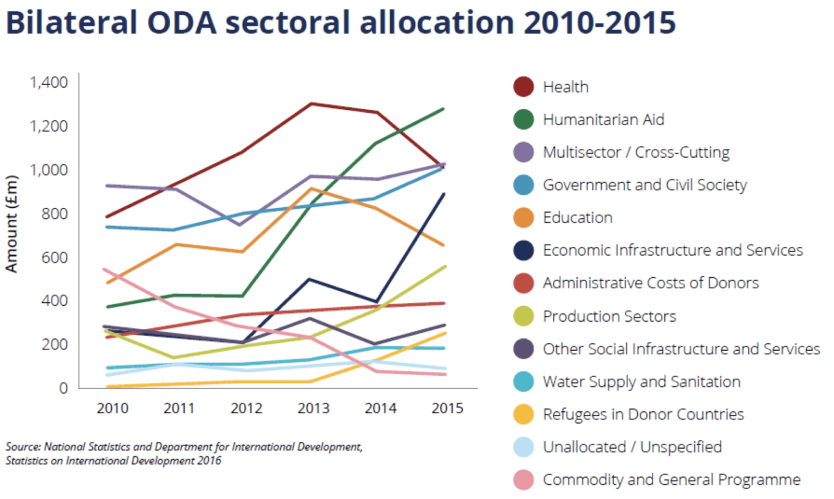
The last decade — not to mention the last year — has seen a lot of changes in international development and aid. A more comprehensive and complex set of global Sustainable Development Goals which will reshape the United Kingdom’s development work and a rapidly shifting political landscape in the U.K. are just the most obvious ones. Aid, and in particular targets such as the 0.7 percent official development assistance / gross national income target which the U.K. has championed, is under sustained attack domestically. The seismic shift that is Brexit is also putting the U.K.’s role in development — including the government’s vision for what international development cooperation means — up for debate in new and often trying circumstances.
Understanding where U.K. aid is now and how it has evolved over recent years are vital to meeting these challenges. A new report on the State of UK Aid looks at this question through the lens of aid’s fundamental objective — to end poverty.
Much has changed but much also remains the same. The picture overall is positive, though there are some emerging challenges in a new development landscape. The U.K.’s current approach has seen real changes in some areas — from a clear focus on economic growth as a central driver to development to pushing a global focus on women and girls’ rights — but in others it is harder to see the impact yet. But the data so far does show some interesting trends.
• The U.K., in many ways, remains a leader in international development, namely as one of the few developed countries to meet key financial commitments such as the 0.7 percent target, which it enshrined in legislation in 2015. The U.K. also sets a high bar in terms of the proportion of aid going to the poorest countries and to support climate change adaptation and mitigation.
• Most importantly, U.K. aid remains focused on poverty. Key sectors to poverty eradication, including social services for example, remain a significant proportion of U.K. development spending and efforts. But there has been an important, if recent and relative, decline in funding to key areas of social spending such as education.

• U.K. aid plays an important role in humanitarian and crisis situations, which is reflected in increased levels of funding particularly since 2011-12. This funding is key to addressing natural or man-made disasters — including climate change related — but also growing levels of displaced people, often within their own countries. This focus on security and migration for example can, however, also carry risks: Not least the securitization of U.K. aid as it is increasingly and overtly aligned with the U.K.’s national interests on security, trade and economic policy potentially at the expense of development impact.
• Economic development and the private sector are ever growing and politically more important areas for U.K. aid. Economic development is the priority that has probably seen the largest relative increase in funding over recent years — which is well in line with the political rhetoric from the government on its importance to long-term sustainable development as well as the increasingly important role the private sector is expected to play as an aid actor.
See more related stories:
▶ UK's cross-government aid strategy falters
▶ UK organizations likely to face funding shortfall after Brexit
▶ Opinion: What is the future of our great British aid?
▶ UK aid prospects brighten slightly in immediate election aftermath
• A much higher proportion of U.K. aid is being spent across government, beyond the Department for International Development, which could encourage a more joined up and holistic approach to sustainable development, but equally risks diluting the poverty eradication focus of aid and raises questions about the effectiveness and capacity of other departments to deliver effectively.
• The effectiveness of U.K. aid is a varied picture. The U.K. has committed to the development and aid effectiveness principles but implementation has been mixed. While there is no doubt the U.K. has led the way on transparency, in other areas crucial principles have fallen down the political agenda — such as country ownership which puts developing countries in charge of and responsible for their own development.
All of these trends, and the political changes and context they’re happening in, suggest some interesting challenges and questions for U.K. aid in the future.
A better understanding of how “U.K. aid in the national interest” will work in practice is needed. It is easy to imagine these two imperatives not aligning perfectly in all circumstances, understanding and managing that potential conflict is vital to protecting the impact and value for money of U.K. aid.
• How the increased role of other government departments will play out in the longer term is not entirely clear. But one thing that is clear is that they need to raise the bar to meet, as a minimum, the standard set by DFID on transparency, but also to ensure that the overall effectiveness and impact of U.K. aid remains high.
• The effectiveness agenda needs a kick start in the U.K. — this isn’t just about principles but about what we know about how aid works best. The U.K. needs to make progress in implementing these commitments whether through DFID, other departments or other actors like the private sector and NGOs.
Coming up with practical, actionable ways to meet these challenges is not an easy task, but it is an important one.
The full report is available here.
For more U.K. news, views and analysis visit the Future of DFID series page, follow @devex on Twitter and tweet using the hashtag #FutureofDFID.








